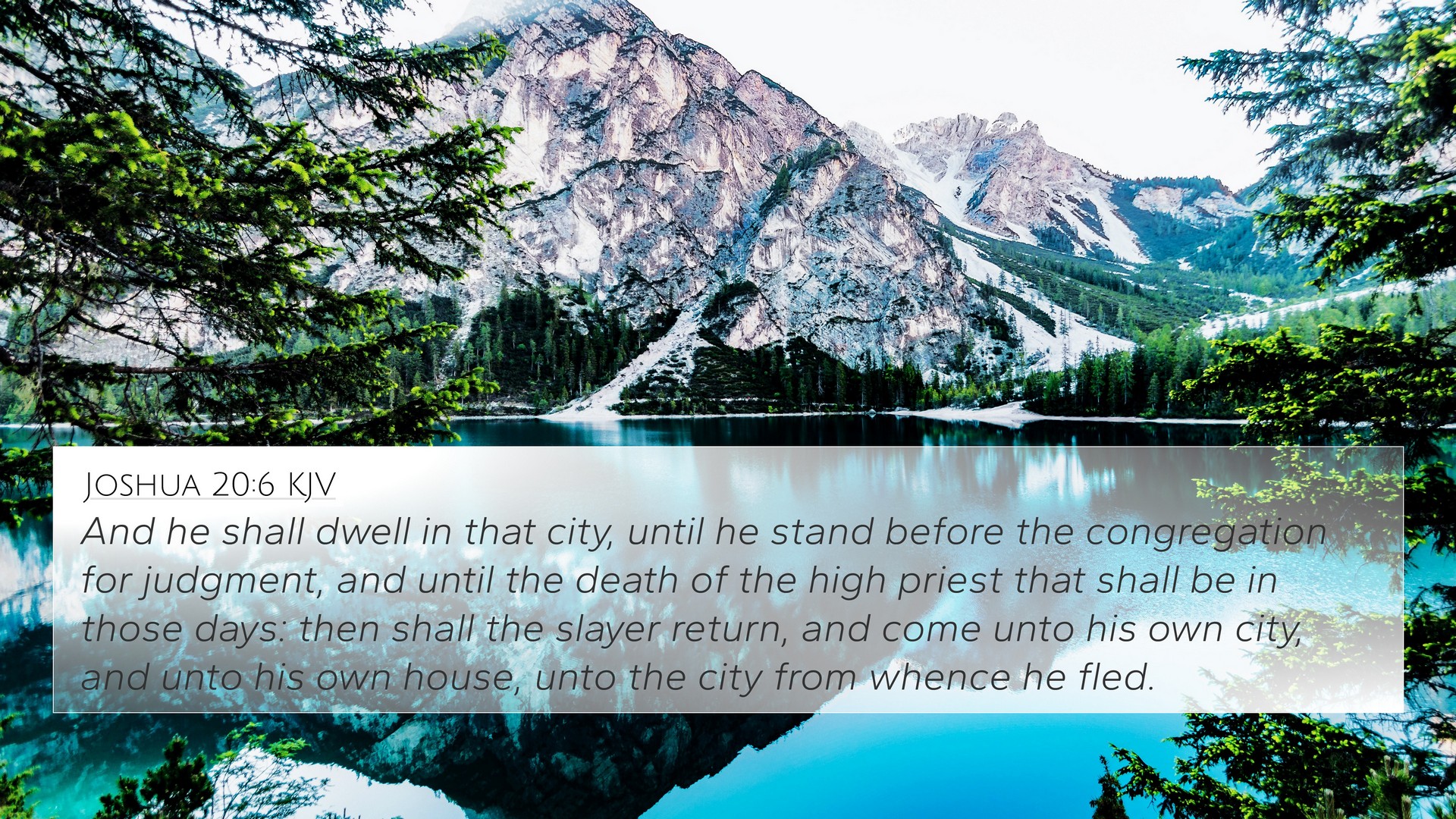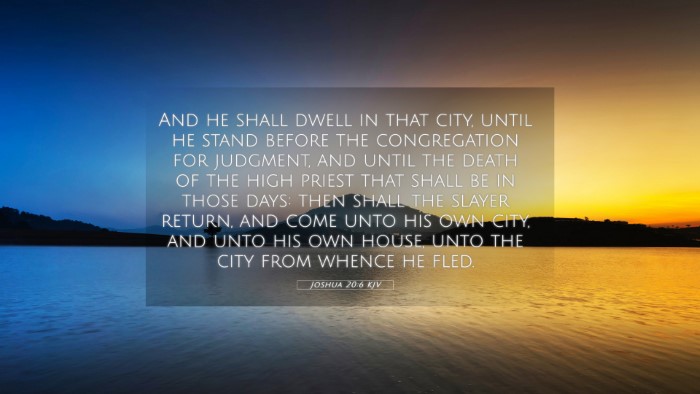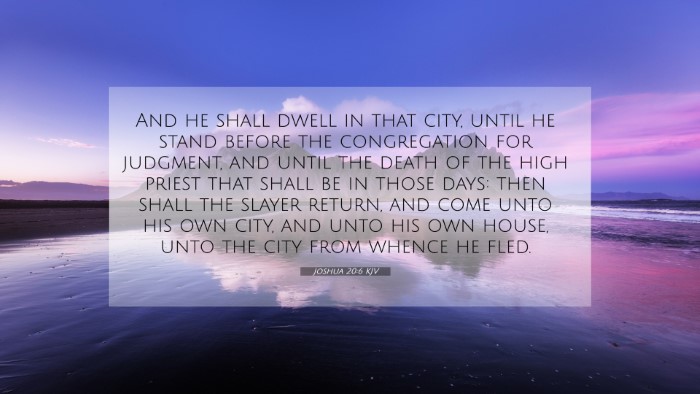Old Testament
Genesis Exodus Leviticus Numbers Deuteronomy Joshua Judges Ruth 1 Samuel 2 Samuel 1 Kings 2 Kings 1 Chronicles 2 Chronicles Ezra Nehemiah Esther Job Psalms Proverbs Ecclesiastes Song of Solomon Isaiah Jeremiah Lamentations Ezekiel Daniel Hosea Joel Amos Obadiah Jonah Micah Nahum Habakkuk Zephaniah Haggai Zechariah MalachiJoshua 20:6 Similar Verses
Joshua 20:6 Cross References
And he shall dwell in that city, until he stand before the congregation for judgment, and until the death of the high priest that shall be in those days: then shall the slayer return, and come unto his own city, and unto his own house, unto the city from whence he fled.
Uncover the Rich Themes and Topics of This Bible Verse
Listed below are the Bible themes associated with Joshua 20:6. We invite you to explore each theme to gain deeper insights into the Scriptures.
Joshua 20:6 Cross Reference Verses
This section features a detailed cross-reference designed to enrich your understanding of the Scriptures. Below, you will find carefully selected verses that echo the themes and teachings related to Joshua 20:6 KJV. Click on any image to explore detailed analyses of related Bible verses and uncover deeper theological insights.

Numbers 35:12 (KJV) »
And they shall be unto you cities for refuge from the avenger; that the manslayer die not, until he stand before the congregation in judgment.
Numbers 35:24 (KJV) »
Then the congregation shall judge between the slayer and the revenger of blood according to these judgments:
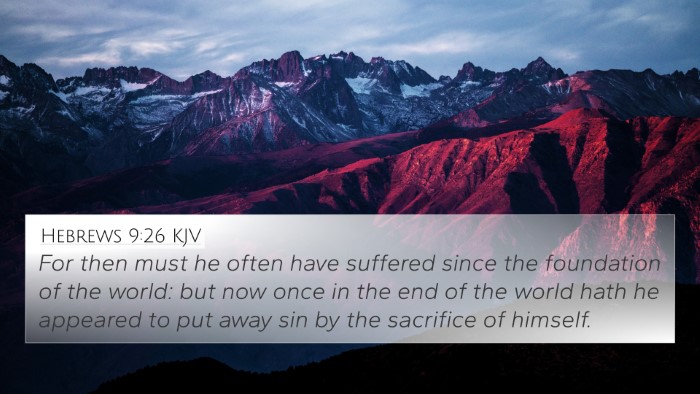
Hebrews 9:26 (KJV) »
For then must he often have suffered since the foundation of the world: but now once in the end of the world hath he appeared to put away sin by the sacrifice of himself.
Joshua 20:6 Verse Analysis and Similar Verses
Bible Verse Interpretation: Joshua 20:6
Verse Text: "And he shall dwell in that city until he stand before the congregation for judgment, and until the death of the high priest that shall be in those days: then shall the slayer return, and come unto his own city, and unto his own house, unto the city from whence he fled." (Joshua 20:6)
Summary of Meaning
Joshua 20:6 speaks about the provisions concerning the cities of refuge for those who unintentionally cause harm or death to others. This verse emphasizes both mercy and justice within God's law, illustrating how the high priest plays a pivotal role in the life of the slayer during their time of refuge.
Commentary Insights
-
Matthew Henry's Commentary:
Matthew Henry notes that the cities of refuge were designed as safe havens for individuals who accidentally committed manslaughter. The verse underscores the importance of the high priest, emphasizing that the slayer must remain in the city of refuge until the high priest's death. This represents God's provision for mercy amidst justice.
-
Albert Barnes' Notes:
Barnes delves into the legal framework of the Old Testament, showing how the sanctuary provided a temporary stop to violence. The slayer's stay in the city until the high priest's death symbolizes the hope of eventual return and reconciliation, reflecting themes of sin, redemption, and divine mercy.
-
Adam Clarke's Commentary:
Clarke highlights the significance of the high priest’s role in this process, indicating how his death marked the transition from guilt to freedom for the slayer. This detail illustrates the broader theological implications of sacrifice and atonement present throughout Scripture.
Thematic Connections
Joshua 20:6 speaks to several critical themes within Scripture, particularly mercy, refuge, justice, and the role of priesthood. These themes resonate with various biblical passages:
- Exodus 21:13-14: Discusses cities of refuge and the conditions for self-defense.
- Numbers 35:11-15: Details on the establishment of cities of refuge for unintentional killers.
- Hebrews 6:18-20: Connects to Jesus as our ultimate refuge and high priest.
- Matthew 5:21-22: Expands on murder and accountability, linking to the idea of unintentional harm.
- Psalm 91:2: Reflects the idea of God as a refuge and fortress for the believer.
- Romans 8:1-2: Illustrates the themes of freedom from condemnation through Christ’s sacrifice.
- 1 Peter 1:18-19: Discusses the redemptive role of Christ’s sacrifice paralleling the high priest's importance.
Cross-Referencing Biblical Texts
This verse can be cross-referenced with various themes found throughout the Bible. Understanding its implications leads to deeper insights into the character of God as a just and merciful protector. The links between the Old Testament and New Testament lead scholars and believers to see continuity in God's plan of salvation and refuge.
Connecting the Verse with Other Scriptures
By analyzing Joshua 20:6 with related verses, one can derive a holistic view of how themes of refuge, protection, and divine justice are threaded through the entirety of Scripture. It’s crucial for Bible study enthusiasts to recognize the theological architecture connecting such scriptures:
- Hebrews 4:14-16: Highlights Jesus as our high priest who sympathizes with our weaknesses.
- Galatians 5:1: Emphasizes the freedom we have in Christ, akin to the slayer's return home upon the high priest's death.
- John 10:9: Jesus describes Himself as the door, illustrating the idea of entering into protection.
- James 2:13: Addresses the law of mercy, shining light on the importance of mercy in judgment, a theme present in Joshua 20:6.
- Romans 12:19: Illustrates divine justice and the idea of leaving vengeance to God, complementing the idea of seeking refuge.
Conclusion
The study of Joshua 20:6 reveals rich layers of meaning, especially when viewed through the lens of other Biblical texts. The interplay of justice, mercy, and provision within God's law offers believers a profound understanding of not just the historical context but theological implications that shape our faith today.
